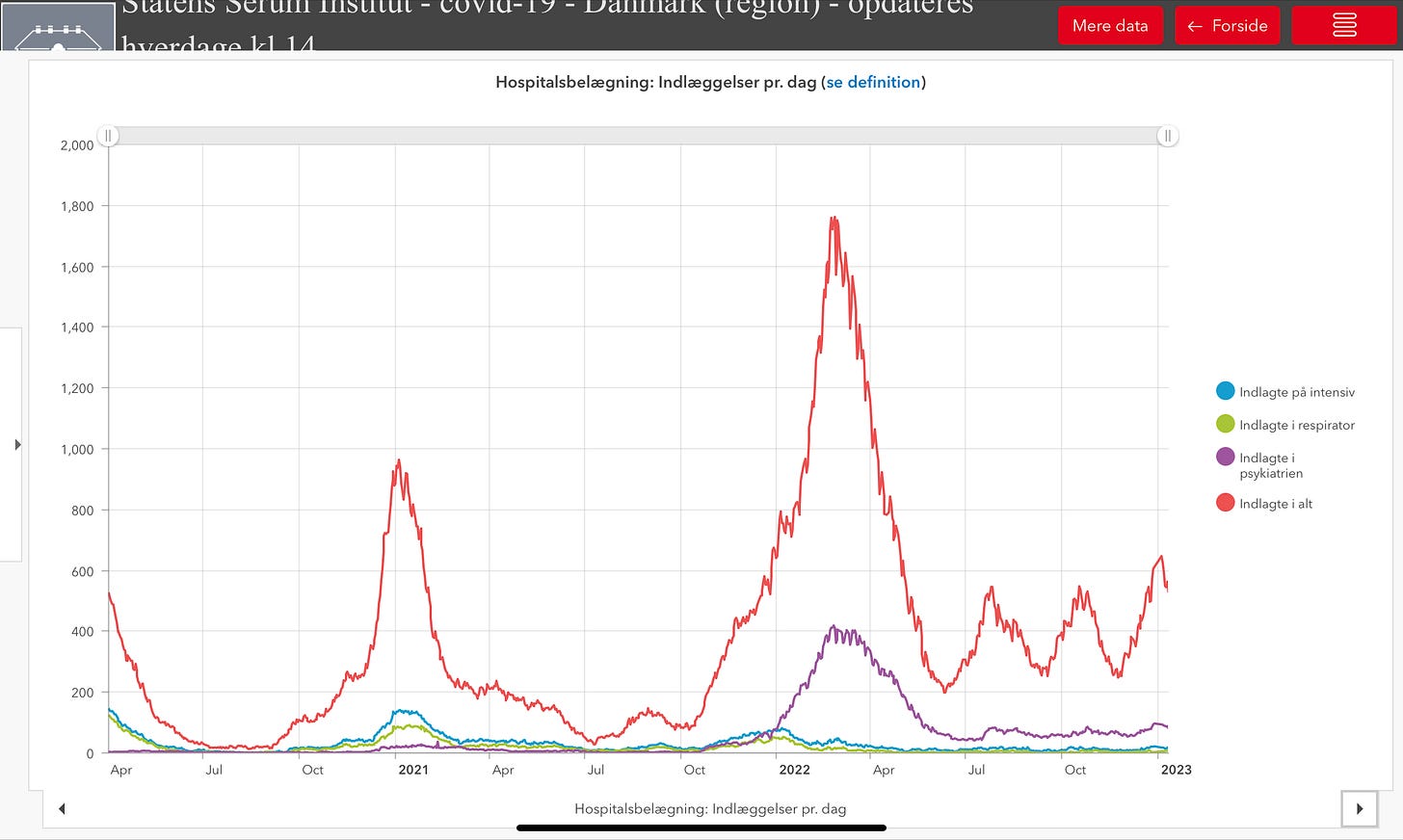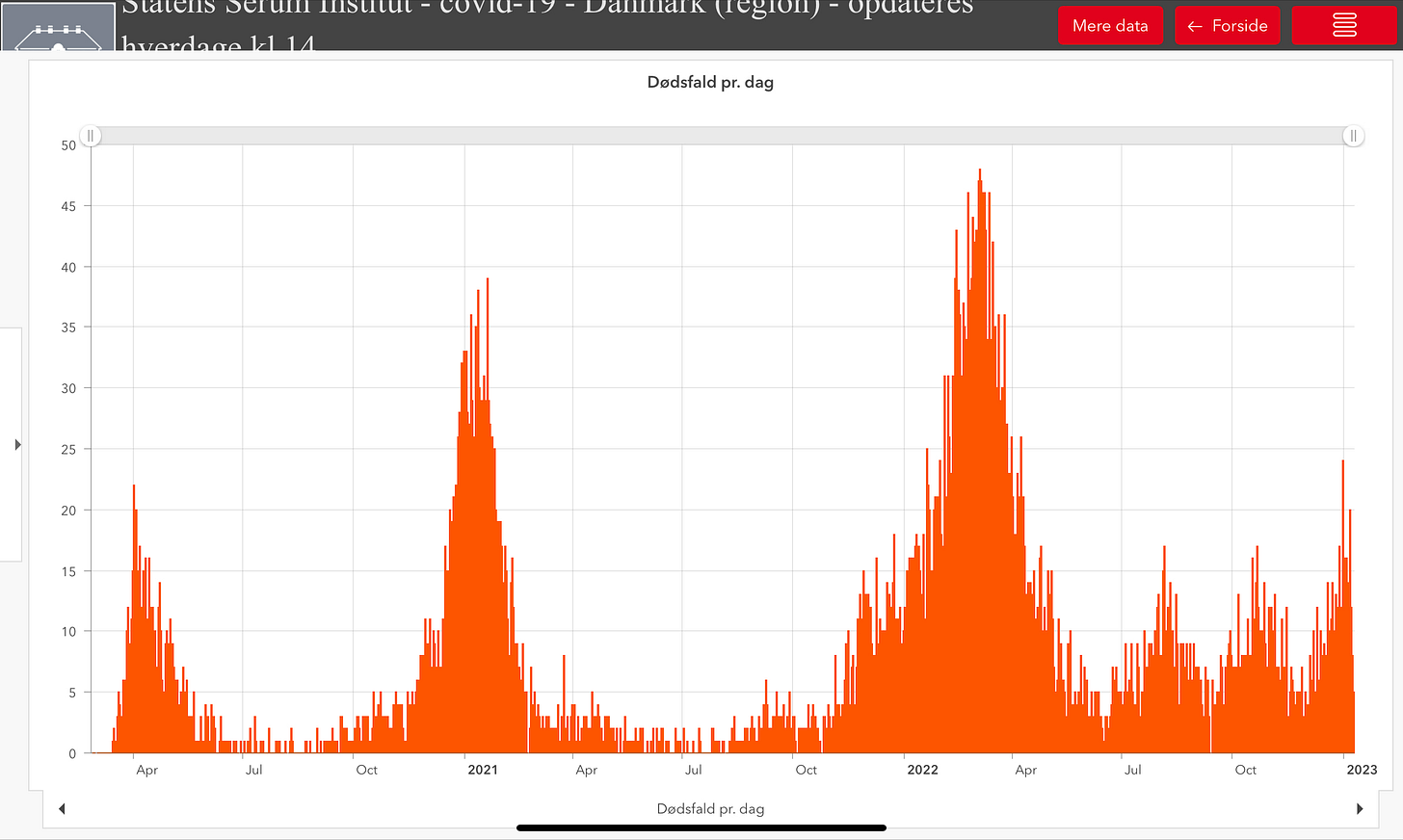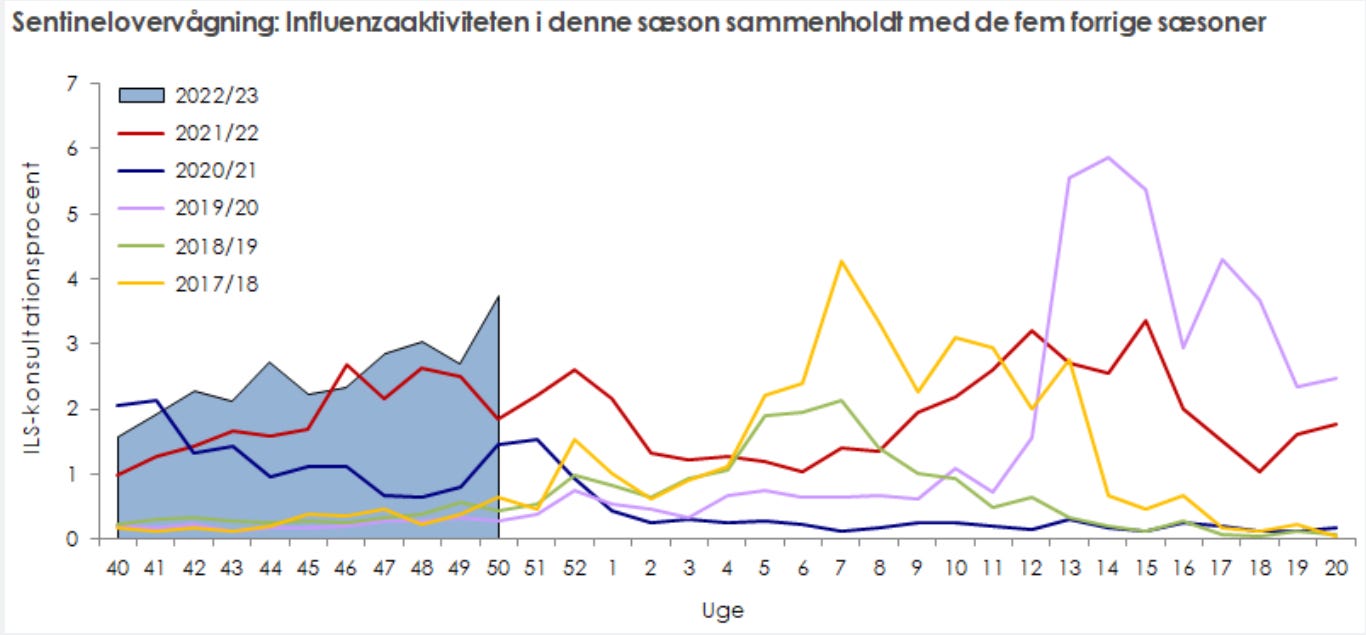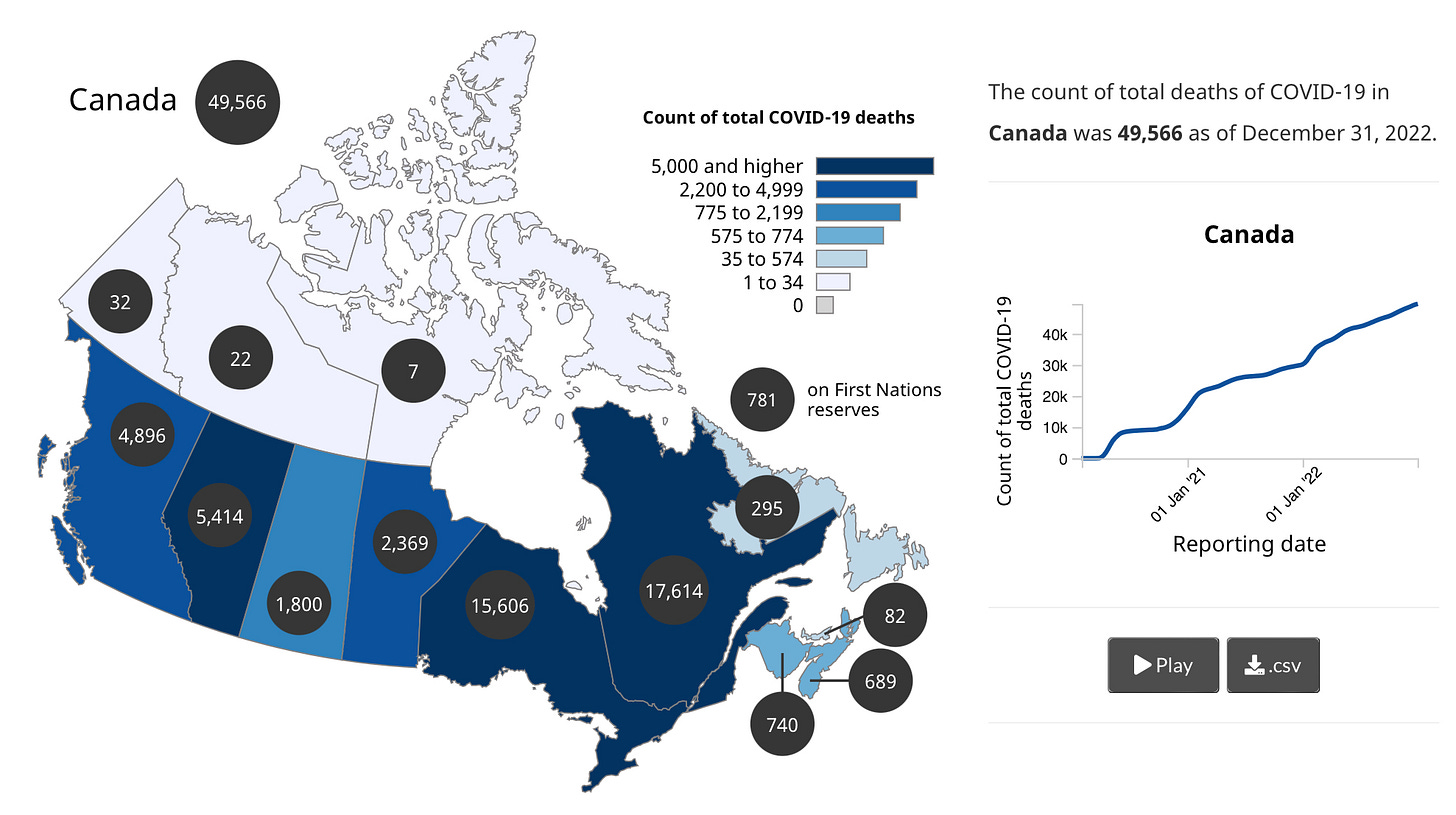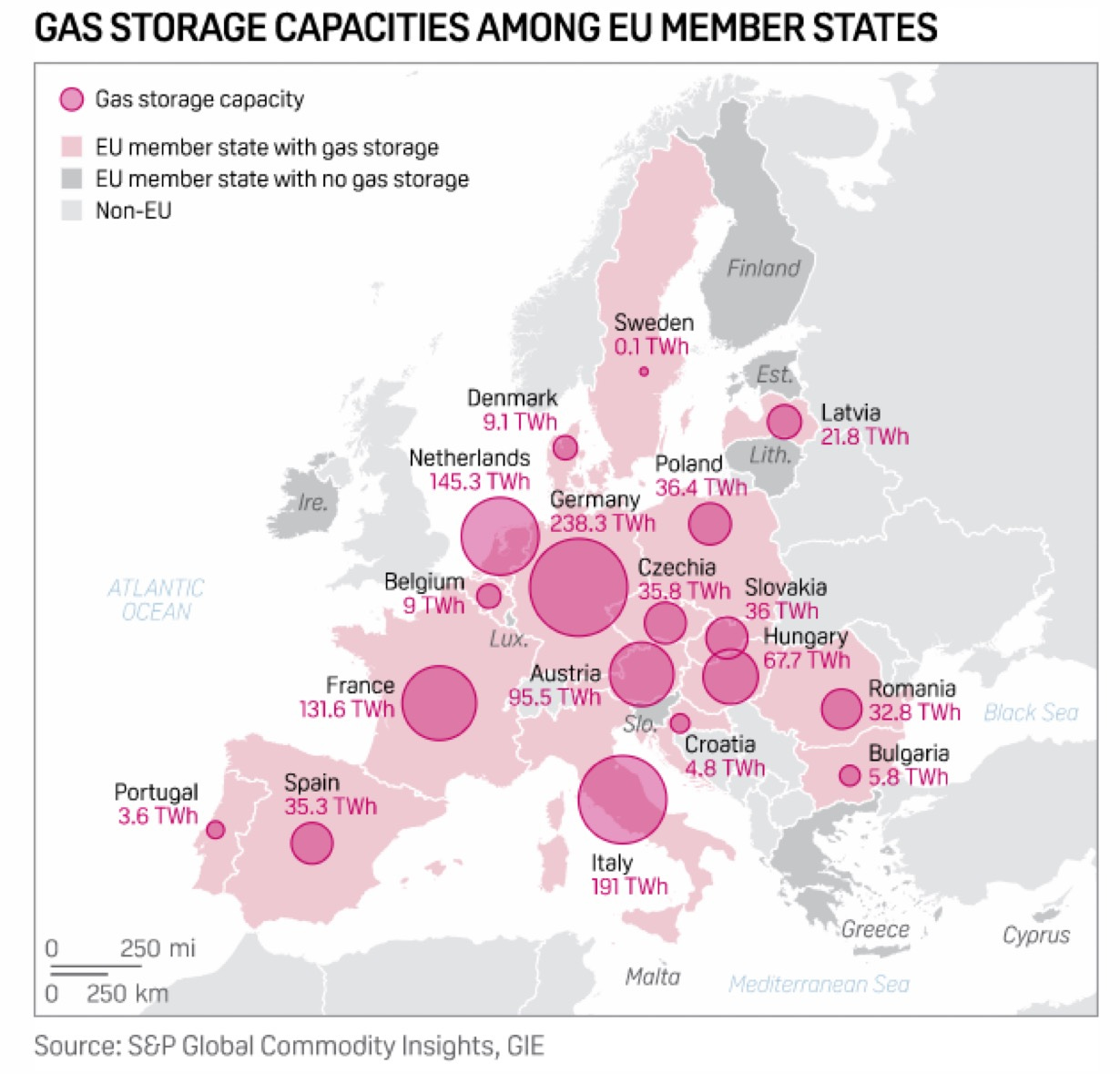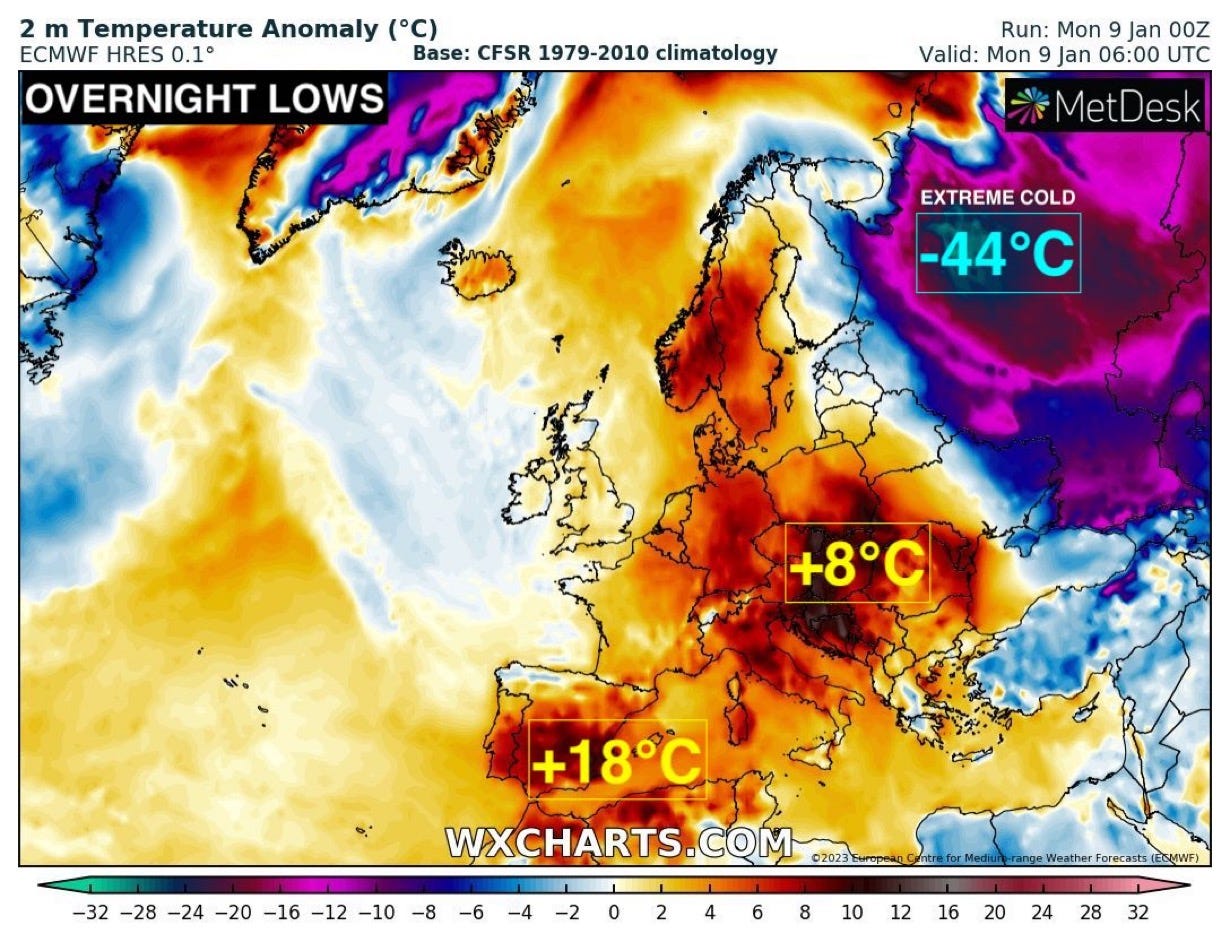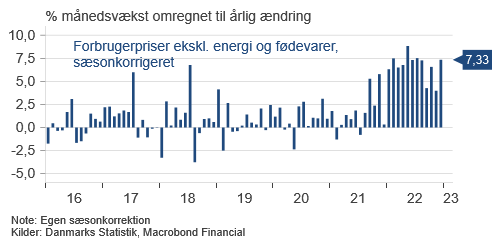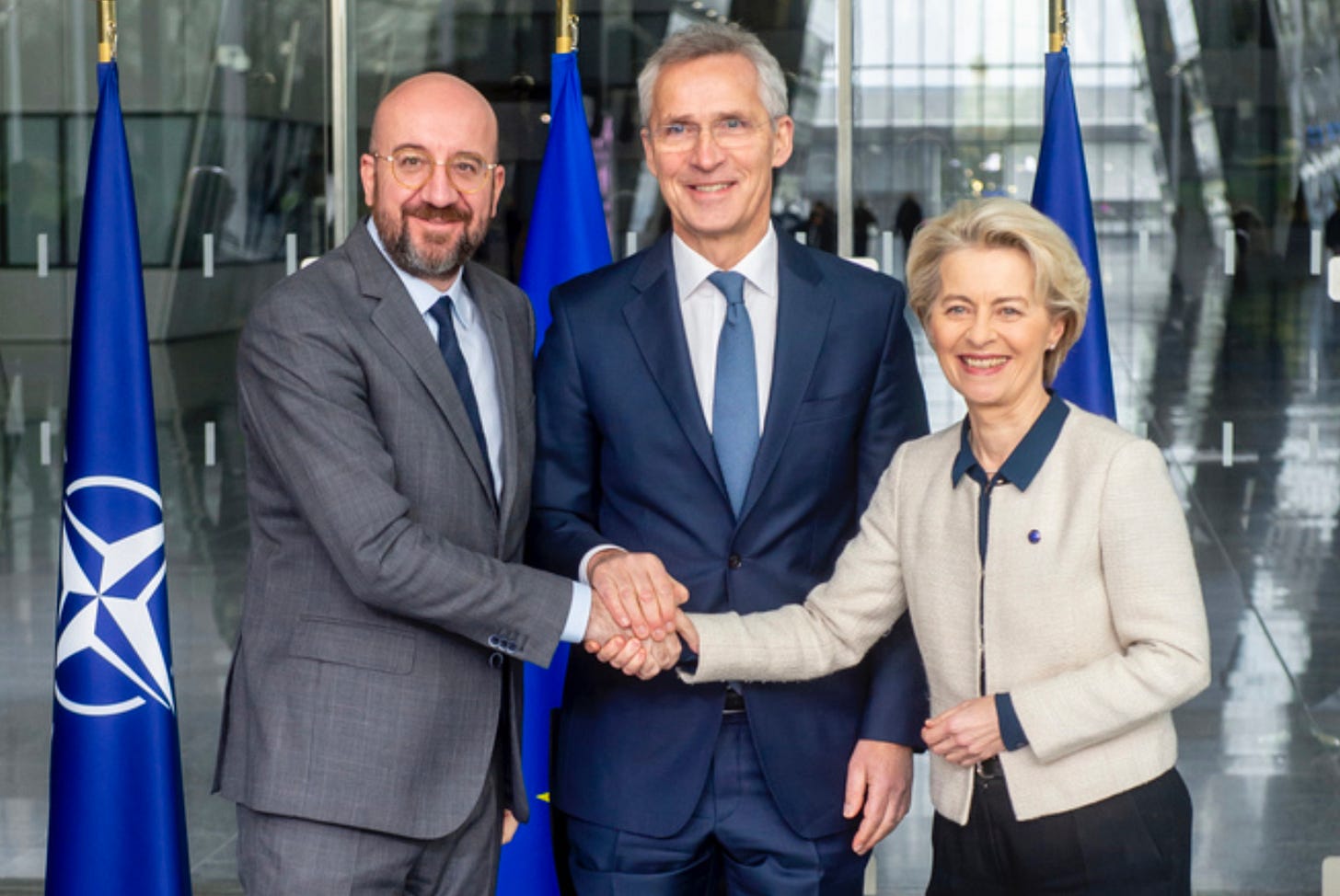The Evening Report - Jan 10
Hospitalizations tumble in Denmark. Warm weather staving off EU energy crisis.
🦠Pandemic🦠
🇩🇰
The wave of COVID, influenza, and RS virus infections forced Aalborg University Hospital to scrub a number of planned operations on Tuesday due to overcrowding. It was so bad patients were overflowing into hospital corridors.
Hospital Director Jens Ole Skov told DR that they believe they have things in hand now and operations and procedures planned for Wednesday and on should proceed as normal. However, the hospital's departments will still have the option to postpone patients if deemed necessary to ensure resources for emergency activity.
-
Denmark’s Epidemic Commission has concurred with the Statens Serum Institute that travel restrictions are not needed for arriving travelers from China. Or at least that Denmark should be involved at the state level in implementing and enforcing them.
Instead of any binding requirements for testing or any other entry restrictions from the state level, Danish Minister of the Interior and Health Sophie Løhde says her ministry is working with the aviation industry to encourage them to implement testing requirements. She would also like airlines flying from China to mandate mask use for all passengers to reduce infection risk.
“We have now received both a health professional assessment from SSI, which monitors the epidemic situation and virus variants in Denmark and abroad, as well as an advisory assessment from the Epidemic Commission, which involves a wide range of authorities and experts. The government will follow the recommendations from SSI and the Epidemic Commission.”
Another possible measure would be to hand out free COVID rapid tests to travelers arriving from China to help infection control after arrival. Efforts are also underway to offer voluntary PCR testing for all arriving visitors from China. As well, COVID wastewater surveillance could be extended to airlines serving Chinese destinations.
Løhde adds that she will meet with the epidemic committee and brief the Danish parliament.
The EU Integrated Crisis Response Council recommended last week that people traveling from China should require a negative COVID test to enter Europe. Since then, Sweden, Germany, and several other European countries have levied entry restrictions on travelers from China.
-
COVID hospitalizations (528) have dropped in Denmark by 28 day to day. But from last Thursday hospitalizations have seen a significant decrease (-98). The number of severely infected people in an ICU (14) is also down (-4) and of those, the number on a ventilator (7) is unchanged day to day.
The number of infection admissions to a psychiatric facility (81) also dipped (-7).
-
Denmark has reported 494 new infections (underreported), including 219 reinfections, and 10 more coronavirus deaths in the last day. There has been a significant
COVID deaths in Denmark/Statens Serum Institute
-
Influenza infections are continuing to rise rapidly.
-
Paying back COVID support funds doled out during the pandemic has been a costly endeavor for a number of Danish businesses, especially those in the construction industry. Bankruptcy filings in Denmark last year rose to a level not seen in 12 years. A total of 2,834 companies declared bankruptcy in 2022, resulting in the loss of 13,700 full time jobs, according to Statistics Denmark.
Lederne Chief Economist Niklas Praefke spoke to Ritzau:
“It is partly a reflection of how harsh the economic situation is right now, and partly that there were that many fiscally unhealthy companies who saved themselves through the COVID crisis with aid packages. It is the perfect storm of historically high cost pressure, higher interest rates and gloomy future prospects.
And Praefke says the bad news isn’t over yet.
“Economic activity is on the way down, and this will drag more companies into bankruptcy.”
-
In non-pandemic news, an adult fox and three fox pups were found dead in two separate parts of Denmark and all four have been confirmed to have been infected with avian flu. This is the first confirmed case in Denmark of bird flu passing from birds to mammals. This was confirmed by the Statens Serum Institute.
Senior Researcher Charlotte Hjulsager:
“It is always worrying when you find bird flu in mammals, because it means that the virus can potentially adapt better to mammals after it has been infected once. But there is nothing immediately alarming in this case.”
The SSI says there is no reason at the moment for concern among the general population.
🇸🇪
The Swedish Public Health Authority only reports COVID statistics once a week, every Thursday afternoon.
-
The hope is that Sweden’s capital region has passed the peak of its latest COVID wave. There are 518 pandemic patients in hospitals around Region Stockholm; that is 91 fewer than there were a week ago. There are 16 severely infected people in an intensive care unit.
Chief Physician Johan Bratt:
“We are seeing reduced numbers of people being treated in hospital for a COVID infection, which is of course positive news. We also see a clear reduction in the number of new cases. But the situation at the region's hospitals is still strained and three emergency hospitals are still on emergency staffing due to the strain on the healthcare system.”
Bratt says whether the region has passed the peak of this coronavirus wave, there are still RS virus and influenza infection cases pouring into hospitals. He says that people need to follow recommendations to reduce infection spread. This includes being vaccinated, staying home when sick, and maintaining good hand-washing habits. Bratt adds this isn’t just about protecting yourself, but also the most vulnerable and high-risk people around you.
Region Stockholm reported another 1,771 COVID infections in the last seven days (wildly underreported). Of those, 177 were vulnerable seniors in care.
The region also suffered another 76 pandemic deaths pushing the to date COVID death toll in Region Stockholm to 5,946 lost lives.
It continues to advise that Sweden continues to struggle with a backlog in reporting coronavirus fatalities. This has been an ongoing problem for well over a year.
🇩🇪
Germany recorded 30,533 infections and another 287 pandemic deaths since Monday’s update.
It added 2,856 more hospitalizations, while ICU numbers (1,284) crept upward (+3). As a percentage of all intensive care beds in the country, COVID patients are using 6.2%.
🇨🇳/ 🇰🇷
The Chinese government is not happy to face travel restrictions imposed on its citizens over the country’s exploding pandemic situation. It has begun to lash out. China has announced it will freeze the issuing of all visas to tourists and business travelers from South Korea. The Chinese embassy in South Korea's capital, Seoul, writes on its website that the visa freeze will be lifted as soon as South Korea removes its "discriminatory measures against travelers from China".
It has also frozen visas for Japan as well.
South Korea has mandated that travelers from China, among other things, must have a negative COVID test to enter the country. It is also limiting air traffic from China.
🇸🇦
Saudi Arabia will remove all COVID restrictions for Muslim pilgrimages, Hajj and Umrah. Hajj is the annual pilgrimage to Mecca which falls on a specific date, and Umrah refers to the pilgrim Muslims who visit Mecca on religious errands at all other times of the year. In 2019, almost three-million Muslims participated in the Hajj and another 19 million made the Umrah pilgrimage. Since the arrival of the COVID pandemic, Saudi Arabia has limited the number of pilgrims and levied other COVID restrictions. This year, it is banking on a return to normal, both for the number of pilgrims making the trip but also the revenues Saudi Arabia reaps.
🇨🇦
The Public Health Agency of Canada is reporting 16,196 new infections over the last week along with 188 more COVID deaths. The to-date death toll in Canada is close to surpassing the 50,000 mark.
The weekly positivity percentage is 15.6%.
⚡️Energy Crisis⚡️
🇪🇺
The unprecedented winter heat wave is continuing into the beginning of 2023. This has continued ti hollow out gas and electricity demand for heating, which is good news on the energy crisis front, and for defanging Russia’s efforts to weaponize its energy exports. But, again, terrible news from a climate change perspective as the existential threat of a warming planet continues.
Temperatures in North West Europe continue to remain well above the 30 year average, as they have since December 22.
This has absolutely crushed the expected demand for natural gas with European Union gas reservoirs sitting at around 83%. Reservoirs have been basically unchanged for the last two weeks. In unprecedented development.
Slovakia has the lowest level of natural gas reserves (73.56%) followed by the Netherlands (76.54%). Poland has the highest gas reserves (96.34%) with Spain (93.58%) and Germany (91.1%) trailing behind.
But, Old Man Winter can be fickle and there are some signs in weather forecasting models that a return to ‘normal’ winter temperatures in North West Europe might be coming in a week or two.
🇷🇺
File this under ‘delicious irony.’ While Europe basks in an unprecedented winter heat wave, Russia, the country trying to freeze the European Union into submission by turning off the gas taps, is seeing brutally cold temperatures.
🇩🇪
The natural gas situation in Germany has improved to the point that the country’s federal regulator is now cautiously hinting that the energy crisis may not be such a concern, at least for this winter. It is now saying that a gas shortage this winter is “extremely unlikely.”
In Germany, falling energy prices have resulted in decreasing inflation, which was 9.6% in December, down from November’s 11.3%.
🇩🇰
The energy crisis has played a big role in increasing inflation. In Denmark, for a second month in a row consumer prices eased, at least on a month-to month basis. In December, prices were 8.7% higher than they were in the same month of the previous year. That is down slightly from November’s 8.9%.
Heating and electricity costs are playing a big part in rising prices in Denmark. Overall inflation, while declining a little, still remains very high. And core inflation, net costs on energy and food, are up a whopping 6.6% annually. Euro-zone business experts are speculating that all of this might add up to a series of interest rate hikes to come.
-
Danish Economist Mikael Olai Milhøj is cautioning that people shouldn’t get too excited about inflation easing. Milhøj says the underlying price pressure is still much too high with monthly prices still seeing “volatile” increases.
“In other words. The price pressure has spread from energy and food to many more goods and services. It will take time before inflation is again consistently around 2%.”
-
Denmark is compensating about 300,000 elderly citizens for the cost of soaring prices driven up by the energy crisis and resulting inflation. 2,000 Danish kroner ($387 Cdn) is going to each person. The money is also tax-free. To qualify, a person must be receiving either an early pension, senior pension, early retirement, or other flexible benefits.
Employment Minister Ane Halsboe-Jørgensen
“These are citizens who have left the labour market and find it difficult to increase their income.”
The money will be automatically deposited in March.
-
The Danish Energy Agency says the use of biogas is increasing in Denmark. It says since 2017 there has been a six-fold increase in biogas use across the country. In 2022, Energistyrelsen says biogas made up 34% of all gas consumption in Denmark. It credits both increasing biogas production and a general transition from natural gas for the significant jump in use.
🇫🇮
The Finnish parliament has moved a step closer to finalizing a one-off payment to compensate people for huge electricity bills driven up by the energy crisis. Yle is reporting that the proposed payment would cover half of qualifying electricity bills in November and December. The maximum possible subsidy will be €700 per month. If approved the money would be doled out in March.
🇺🇦/ 🇷🇺 War
🇩🇰/ 🇺🇦
Denmark could supply Ukraine with Caesar artillery systems, but it won’t happen anytime soon. Danish Foreign Affairs Minister Lars Løkke Rasmussen met with NATO Secretary General Jens Stoltenberg on Wednesday and told him that Denmark will decide “within a very short time” if it will send the artillery systems to Ukraine.
The one fly in the ointment is that the long range cannons haven’t been fully produced for the Danish armed forces yet. So delivery will take a while.
Rasmussen said the choice for Denmark is between building up its own military to meet NATO levels or supporting Ukraine. He says the choice in some ways is an easy one.
“If you come to a crossroads, then you have to say that weapons used in Ukraine, all things being equal, are better than weapons in storage in Denmark.”
The armoured truck mounted artillery system can hit targets up to 40 kilometers away.
-
The echoes of Viking history. Copenhagen and Kyiv are on their way to becoming what we would call “sister cities” in North America and what is referred to as a “twinning agreement” in Denmark.
Copenhagen Lord Mayor Sophie H. Andersen:
“In the autumn I received a letter from the mayor of Kyiv Vitalii Klitschko, hoping for help. He reached out to me and requested a twinning agreement between Copenhagen and Kyiv. We have since worked on an agreement and are now on our way to becoming twinned cities.”
Andersen says final details are still being worked out and the agreement would need the approval of both Copenhagen and Kyiv city councils before coming into force.
“Copenhagen stands with the Ukrainians and Kyiv. We have received several thousand Ukrainians during the year, and we are doing everything we can to help them through a difficult time. But it is my hope that we can do even more for their homeland at war by contributing to the reconstruction of Kyiv. In this way, we can help from one capital to another, and we can connect our populations even better.”
Copenhagen has purposely avoided such ‘twinning’ agreements in the past but in light of the Russian invasion and the ongoing plight of the Ukrainian people, the city’s Economic Administration felt an exception was warranted.
Copenhagen mayor of employment and integration Jens-Kristian Lütken:
“During the past year, some very special human relationships have arisen between Copenhageners and Ukrainians. Many Copenhageners have become involved in helping Ukraine, and therefore it is obvious that we form even closer ties to the country's capital. I have visited Ukraine three times in the past year, and it is absolutely clear to me that all forms of support are essential for the Ukrainian struggle to live in freedom. I see cooperation with Kyiv as something that holds great opportunities for both Copenhagen and Ukraine, both culturally, humanly and economically.”
The agreement could facilitate Danish help in rebuilding Kyiv with, for example, Copenhagen Kommune sending its experts in construction, urban development, and planning to Kyiv to help with the rebuilding effort.
Copenhagen has taken in around 3,000 Ukrainian refugees since the war started.
Initially, the agreement is expected to be valid for a three-year period.
The two cities share a Viking history, with Kyiv being founded by Vikings who were pushing east to conquer new territory and establish new kingdoms.
🇩🇰
The delivery of the next generation fighter jets to Denmark has been delayed. Their has been an accident with an F-35 fighter jet in the United States. The delays are because the manufacturer, Lockheed Martin, has now initiated an investigation into the accident to see if any larger safety issues exist. Until the investigation has concluded delivery of the aircraft has been temporarily suspended.
The first F-35 jets were due to begin arriving in Denmark in February. Last year, the Danish Air Force delayed the phasing out of its current F-16 fleet due to Russia’s invasion of Ukraine and the suddenly uncertain military situation in Europe.
🇸🇪/ 🇺🇦
Sweden is pledging to send more weapons to Ukraine. This week, Swedish Prime Minister Ulf Kristersson says Ukraine will receive Archer self-propelled artillery systems in its latest weapons donations package.
🇸🇪
Citing the “current security situation” Sweden is taking steps to reintroduce conscription to shore up municipal emergency services.
Civil Defense Minister Carl-Oskar Bohlin
“Civil duty can be said to be the civil defense's equivalent to conscription. An activation of civil duty can mean that people who are subject to full military service can be trained and deployed within the municipal rescue service.”
The goal is to bolster municipal emergency response manpower to draw upon in the event a state of emergency is declared or if Sweden is under attack.
Final details are still being worked out, but the goal is to have everything ready to go by March. At this point the number of civilians who would need to be called up is not clear.
-
Sweden has begun negotiations with the United States on a Defense Cooperation Agreement, essentially a framework covering all the facets and conditions of having American troops and potentially a base or bases in Sweden.
Per the release:
“The security situation in Europe has changed fundamentally with Russia's unprovoked aggression against Ukraine. The new, deteriorating security situation means that Sweden needs to be able to act quickly on a complex security development, individually, and together with others.”
The DCA covers things like the legal status of US military personnel, access to base areas, advance storage of materiel, taxes, and duties. The agreement also creates conditions for American military support if the security situation requires it.
Any final agreement must be approved by the Swedish parliament before it can come into force.
🇪🇺/ NATO
The European Union and NATO have signed a Joint Declaration on EU/NATO Cooperation.
NATO Secretary General Jens Stoltenberg spoke at the Tuesday press conference after the signing.
“We are determined to take the partnership between NATO and the European Union to the next level.”
Russia’s invasion of Ukraine, the security situation, and growing geopolitical threats, have underscored the need for much deeper cooperation between the military alliance and European authorities.
Stoltenberg says another reason the ties that bind must grow stronger is the potential addition of Sweden and Finland into NATO.
“[It] will become even more important once Finland and Sweden become full NATO members. With their accession, NATO will be protecting 96% of citizens in the European Union, and a higher share of its territory than ever before.”
A copy of the joint declaration can be found HERE.
🇺🇦/ 🇪🇺 NATO
Tanks or no tanks? The argument over sending Ukraine more modern tanks has been an acrimonious one in Europe, but there are signs that the dam is beginning to break. The United States and Britain have committed to sending more modern armoured vehicles to Ukraine, and the pressure to follow suit in Europe is building.
NATO Secretary General Jens Stoltenberg told the newspaper Svenska Dagbladet that getting Ukraine more modern tanks is still a possibility including the German Leopard or American Abrams tanks. Stoltenberg says regardless, western countries need to get more weapons to Ukraine.
“If we want a negotiated peace solution, where Ukraine survives as an independent democratic country in Europe, the fastest way to get there is to support Ukraine. Weapons are, in fact, the way to peace.”
🇫🇮/ 🇺🇦
Finland is prepared to donate more modern tanks to Ukraine provided there is a broader European consensus to do so. Talking to MTV3 News the Chair of Finkand’s Parliamentary Defense Committee Antti Häkkänen says it would also require government negotiations and only if donating the tanks didn’t compromise Finland’s own military abilities. In particular, Häkkänen says that Finland is watching to see what Germany and France do.
It is believed Finland has about a tenth of the total number of Leopard 2 tanks in Europe, about 200 of them.
Finland has donated about €190 million in military aid to Ukraine so far and is preparing its 12th weapons donation package to date.
🇨🇦/ 🇺🇦
Canada is going to purchase a missile defense system and donate it to Ukraine. According to a read-out of a call between Prime Minister Justin Trudeau and US President Joe Biden, Trudeau informed Biden Canada is purchasing a NASAMS system for Ukraine.
The news was then confirmed by Ukrainian President Volodymyr Zelenskyy.
The NASAMS surface-to air missile system has a price tag of about $400 million. It was developed in a collaboration between American defense company Raytheon and Norwegian-based Kongsberg Defense and Aerospace.




